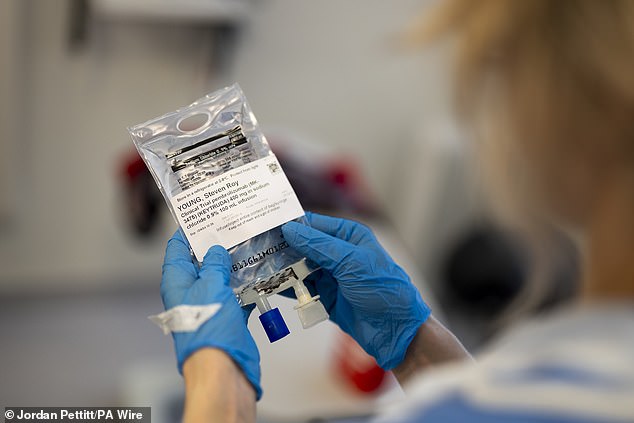New skin cancer vaccine being tested by the NHS could halve the risk of death or recurrence of the deadly disease, research shows
- Melanoma patients received an injection in addition to the immunotherapy drug Keytruda
- They were 49 percent more likely to live compared to using Keytruda alone
- The vaccine is tailor-made for individuals using the genetic makeup of their tumor
A skin cancer vaccine being tested by the NHS could halve the risk of death or recurrence of the disease, results show.
In the longest study of the treatment to date, melanoma patients who received the personalized injection in addition to the immunotherapy drug Keytruda were 49 percent more likely to be alive three years later compared to those who took Keytruda alone – the current standard of care.
Experts said they “fully expect similarly impressive results” in trials of vaccines against other cancers, including breast and colon.
Developed by pharmaceutical giants Moderna and MSD, the vaccine is tailor-made for individuals who take advantage of the specific genetic makeup of their tumor, giving it the best chance of cure.
It is injected into patients after they have had surgery and works by telling the body to detect cancer cells to prevent the deadly disease from returning.
The study, presented at the American Society of Clinical Oncology (ASCO) conference in Chicago, involved 157 patients with stage 3 or 4 of the deadliest form of skin cancer.
Melanoma patients who received a personalized shot in addition to the immunotherapy drug Keytruda were 49 percent more likely to be alive three years later compared to those who only took Keytruda
Iain Foulkes, executive director of research and innovation at Cancer Research UK, said the findings add to the “exciting, evolving landscape of cancer vaccine research”.
A second study presented in Chicago found that vaccines can significantly improve breast cancer patients’ survival after surgery.
Led by a team from the University of Vienna, the vaccine – tecemotide – increased survival by 16 percent in 400 patients with early-stage breast cancer.
Lead author Dr Christian Singer said: ‘This is the first profound long-term survival benefit of an anti-cancer vaccine in breast patients.’

The vaccine is injected into patients after they have had surgery and works by telling the body to detect cancer cells to prevent the deadly disease from returning
